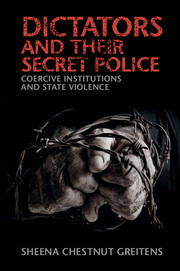Book contents
- Frontmatter
- Dedication
- Contents
- List of tables and fi gures
- A note on romanization
- Acknowledgments
- PART I THE PUZZLE AND THE ARGUMENT
- 1 Introduction
- 2 A theory of coercive institutions and state violence
- PART II THE ORIGINS OF COERCIVE INSTITUTIONS
- PART III COERCIVE INSTITUTIONS AND STATE VIOLENCE
- PART IV EXTENSIONS AND CONCLUSIONS
- Appendix: A note on sources
- Index
- Miscellaneous Endmatter
1 - Introduction
from PART I - THE PUZZLE AND THE ARGUMENT
Published online by Cambridge University Press: 05 August 2016
- Frontmatter
- Dedication
- Contents
- List of tables and fi gures
- A note on romanization
- Acknowledgments
- PART I THE PUZZLE AND THE ARGUMENT
- 1 Introduction
- 2 A theory of coercive institutions and state violence
- PART II THE ORIGINS OF COERCIVE INSTITUTIONS
- PART III COERCIVE INSTITUTIONS AND STATE VIOLENCE
- PART IV EXTENSIONS AND CONCLUSIONS
- Appendix: A note on sources
- Index
- Miscellaneous Endmatter
Summary
The use of violence by authoritarian regimes against their people has long been central to the trajectories of world politics and of human history. Historically, authoritarianism rather than democracy has been the norm, and much of citizen interaction with the state has been centered on trying to avoid abuse at the hands of those in power. Today, too, autocracies comprise a significant fraction of the world's countries. These regimes govern almost 60 percent of the world's population, dominate geopolitically critical regions of Asia, the Middle East, and Africa, and lead several of the world's great powers. From the gulags of Stalinist Russia to the failed protests in China's Tiananmen Square in 1989 to the post-Arab Spring crackdowns in Egypt and Syria, repression plays a central role in our conception of dictatorship; history and literature have provided us with towering accounts of the human effects of institutionalized terror.
The stakes of that repressive activity are high, for both regimes and their citizens. When militaries agree to repress, citizens are often killed in large numbers in public spaces, with reverberations around the globe; when coercive agents balk at participating in government crackdowns, their intransigence can topple dictators and pave the way for transitions to democracy (or to another autocracy). Where state coercion is unopposed by citizens, some of the world's worst human rights abuses can come to pass, as has happened in North Korea; but where it is resisted, as has happened in Syria, the struggle can metastasize into insurgency or civil war, and can even trigger external intervention leading to interstate conflict.
The abuses committed by states against their citizens, however, are a relatively overlooked source of political violence in the world. Conceptualizing authoritarian regimes as uniformly dependent on coercion ignores a critical element of variation in their governance: the different ways in which they use violence and repression to maintain power. In some places and at some times, autocratic regimes rely on low-intensity forms of repression such as surveillance and intimidation, while at other times they turn to high-intensity violence such as mass killing. Eighteen people per year died under Brazil's military junta, while the annual death rate in Argentina under military rule was a staggering 1,280.
- Type
- Chapter
- Information
- Dictators and their Secret PoliceCoercive Institutions and State Violence, pp. 3 - 16Publisher: Cambridge University PressPrint publication year: 2016



